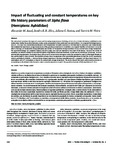Please use this identifier to cite or link to this item:
http://www.alice.cnptia.embrapa.br/alice/handle/doc/1034881Full metadata record
| DC Field | Value | Language |
|---|---|---|
| dc.contributor.author | AUAD, A. M. | pt_BR |
| dc.contributor.author | SILVA, S. E. B. | pt_BR |
| dc.contributor.author | SANTOS, J. C. | pt_BR |
| dc.contributor.author | VIEIRA, T. M. | pt_BR |
| dc.date.accessioned | 2016-01-23T11:11:11Z | pt_BR |
| dc.date.available | 2016-01-23T11:11:11Z | pt_BR |
| dc.date.created | 2016-01-23 | pt_BR |
| dc.date.issued | 2015 | pt_BR |
| dc.identifier.citation | Florida Entomologist, v. 98, n. 2, p. 424-429, 2015. | pt_BR |
| dc.identifier.uri | http://www.alice.cnptia.embrapa.br/alice/handle/doc/1034881 | pt_BR |
| dc.description | This study aimed to evaluate the impact of constant and fluctuating temperatures on the biology of Sipha flava (Forbes) (Hemiptera: Aphididae) in order to determine whether the results of laboratory studies can be extrapolated to those performed in natural conditions. We compared the biological parameters of S. flava kept in an uncontrolled greenhouse in which temperatures fluctuated (treatment 1) with those kept in a phytotron-type climate chamber that simulated the mean hourly average temperatures of the greenhouse (treatment 2). In addition, we compared the effects of treatment 2 versus the effects of having a set temperature during photophase and another set temperature during scotophase versus a constant daily average temperature. The experimental design was completely random, and 150 nymphs were used per treatment at the outset of the biossays. However, the number of repetitions was altered in relation to survival of the aphids in the different instars and treatments. By daily use of a stereoscopic microscope, we evaluated the following parameters: the duration (days) and survival (%) of each instar and stage as well as the reproductive capacity (offspring per female per day) and the longevity (days) of adults. The simulation of mean hourly temperatures of an uncontrolled greenhouse favored the survival, reproductive capacity, and longevity of adults ? which are factors of great importance in the insect population growth ? compared with those insects kept at 27 °C (photophase) and 18 °C (scotophase) or kept at the constant daily average temperature. The results showed that much caution must be exercised in extrapolating results obtained in the laboratory under constant temperatures to predict the population dynamics of field populations of S. flava. | pt_BR |
| dc.language.iso | eng | eng |
| dc.rights | openAccess | eng |
| dc.subject | Insect | pt_BR |
| dc.subject | Aphid | pt_BR |
| dc.title | Impact of fluctuating and constant temperatures on key life history parameters of Sipha flava (Hemiptera: Aphididae). | pt_BR |
| dc.type | Artigo de periódico | pt_BR |
| dc.date.updated | 2016-03-18T11:11:11Z | pt_BR |
| dc.subject.nalthesaurus | forage | pt_BR |
| riaa.ainfo.id | 1034881 | pt_BR |
| riaa.ainfo.lastupdate | 2016-03-18 | pt_BR |
| dc.contributor.institution | ALEXANDER MACHADO AUAD, CNPGL; Sandra E. B. Silva; Juliana C. Santos; Tamiris M. Vieira. | pt_BR |
| Appears in Collections: | Artigo em periódico indexado (CNPGL)  | |
Files in This Item:
| File | Description | Size | Format | |
|---|---|---|---|---|
| Cnpgl2015FloridaEntImpact.pdf | 734,33 kB | Adobe PDF |  View/Open |









